| Srl | Item |
| 1 |
ID:
079585
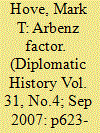

|
|
|
| 2 |
ID:
074508
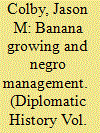

|
|
|
| 3 |
ID:
170805
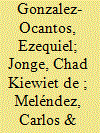

|
|
|
|
|
| Summary/Abstract |
How do parties target intimidation and vote-buying during elections? Parties prefer the use of carrots over sticks because they are in the business of getting voters to like them and expect higher legitimacy costs if observers expose intimidation. However, their brokers sometimes choose intimidation because it is cheaper and possibly more effective than vote-buying. Specifically, we contend that brokers use intimidation when the cost of buying votes is prohibitively high; in interactions with voters among whom the commitment problem inherent to clientelistic transactions is difficult to overcome; and in contexts where the risk of being denounced for violence is lower. We probe our hypotheses about the different profile of voters targeted with vote-buying and intimidation using two list experiments included in an original survey conducted during the 2011 Guatemalan general elections. The list experiments were designed to overcome the social desirability bias associated with direct questions about illegal or stigmatized behaviors. Our quantitative analysis is supplemented by interviews with politicians from various parties. The analysis largely confirms our expectations about the diametrically opposed logics of vote-buying and intimidation targeting, and illuminates how both are key components of politics in a country with weak parties and high levels of violence.
|
|
|
|
|
|
|
|
|
|
|
|
|
|
|
|
| 4 |
ID:
173091
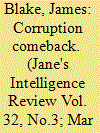

|
|
|
| 5 |
ID:
015950
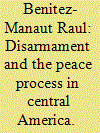

|
|
|
|
|
| Publication |
1992.
|
| Description |
133-147
|
|
|
|
|
|
|
|
|
|
|
|
|
|
|
|
| 6 |
ID:
119722
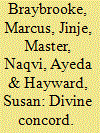

|
|
|
|
|
| Publication |
2011.
|
| Summary/Abstract |
For many, religion is more a matter of identity than of belief. The focus is on what you wear, what you eat, or whom you marry. As such, religion is seldom the primary cause of conflict but can add to hostility. You may be killed because you are uncircumcised, but not because of what you actually believe in. When conflict starts-besides caring for the injured and refugees, protecting non-combatants, counteracting propaganda, and calling for peace-there is little a religion can do.
|
|
|
|
|
|
|
|
|
|
|
|
|
|
|
|
| 7 |
ID:
126988
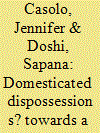

|
|
|
|
|
| Publication |
2013.
|
| Summary/Abstract |
Geopolitics today is increasingly marked by the violent convergence of (in)security, market integration, and dispossession. Yet few studies address the connected, counter-insurgent geopolitics of ostensibly ameliorative, women-focused development interventions in the (post)colonial world. This paper charts a new theorisation of the geopolitics of development by focusing on gendered social movements, intersecting relations of difference, and social reproduction in two seemingly distinct areas: rural Guatemala and urban India. It introduces a transnational feminist geopolitical analytic - based on relational comparison, critical ethnography, and collaborative dialogue - to elucidate both specificity and global interconnection. Specifically, this consists of analysing struggles over dispossession through processes of 'de(bt)velopment' in the Ch'orti' Highlands and 'redevelopment' in Mumbai at key historical conjunctures. These struggles illuminate not only (in)securities experienced by marginalised groups but also the transformative potentialities and domesticating limitations of social mobilisation. In conclusion, the paper offers insights into the how of doing more liberatory geopolitical praxis.
|
|
|
|
|
|
|
|
|
|
|
|
|
|
|
|
| 8 |
ID:
132071
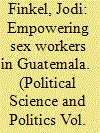

|
|
|
|
|
| Publication |
2014.
|
| Summary/Abstract |
In 2005, with two of my students, I started a literacy program in a red-light district in Guatemala City. In 2007, we became a nonprofit organization dedicated to the promotion of the rights of sex workers in Guatemala (i.e., Women for Justice, Education, and Awareness, known in Spanish as MuJER). Today, MuJER provides literacy classes and accelerated elementary school, vocational training, antiviolence programs, and grassroots organizing. We have worked with hundreds of women, both at our Community Empowerment Center and "door-to-door" in red-light districts. Using the experience of MuJER, this article provides recommendations for professors interested in working with students to create a nonprofit in the developing world: select students whose skill sets are different than your own; start by creating a program (not by formally establishing a 501(c)(3) tax-exempt organization); and recognize that the nonprofit's long-term sustainability requires commitment to grant writing for years to come.
|
|
|
|
|
|
|
|
|
|
|
|
|
|
|
|
| 9 |
ID:
109832
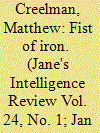

|
|
|
| 10 |
ID:
101067
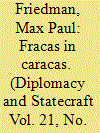

|
|
|
|
|
| Publication |
2010.
|
| Summary/Abstract |
The Eisenhower Administration claimed a diplomatic triumph-and a mandate to overthrow the elected government of Guatemala-after the Tenth Inter-American Conference held in Caracas, Venezuela, in March 1954, when 17 nations voted for an American resolution condemning international Communism. This article disputes the official story and some recent scholarly depictions of the conference. Caracas was the scene of intense Latin American opposition to the American agenda. Vote-buying was rampant as Washington made hundreds of millions of dollars worth of concessions to individual countries. Nonetheless, amendments pushed through by Latin American diplomats transformed the interventionist American resolution into a strong statement against intervention. The American "triumph" was actually a fiasco that called into sharp relief the difference between United States and Latin American understandings of the inter-American system, demonstrating Latin American diplomatic resistance to intervention and the limits of diplomacy's potential to constrain the actions of the most powerful American state.
|
|
|
|
|
|
|
|
|
|
|
|
|
|
|
|
| 11 |
ID:
129195
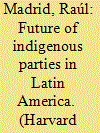

|
|
|
|
|
| Publication |
2014.
|
| Summary/Abstract |
After a long period of relative quiescence, indigenous movements in Latin America have mobilized. A wave of indigenous protests swept through the Andean countries beginning in the 1980s and made its presence felt as far north as Mexico. Indigenous groups have blocked roads, occupied buildings, and held mass rallies to let their demands be known. They have also entered the electoral arena in unprecedented numbers. Some indigenous groups and leaders have allied with non-indigenous parties, lending their support to the parties in exchange for candidacies or policy concessions. Other indigenous groups have opted to form their own political parties. In Bolivia, Colombia, Ecuador, and Guatemala, indigenous parties have launched presidential campaigns and in a host of other Latin American countries indigenous parties have competed in legislative or municipal elections.
Bolivia's Movement toward Socialism, known as the MAS for its Spanish initials, has been the most successful of the indigenous parties. The MAS has dominated Bolivian politics since 2005, winning every major election since that time. Its leader, Evo Morales, has occupied the presidency for the last eight years, and the MAS currently controls both houses of the Bolivian legislature as well as most of the country's departments.
|
|
|
|
|
|
|
|
|
|
|
|
|
|
|
|
| 12 |
ID:
083579
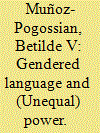

|
|
|
|
|
| Publication |
2008.
|
| Summary/Abstract |
After visiting Latin America in 1950, George F. Kennan presented a report to the Secretary of State Dean Acheson on his impressions of the region and its significance for the United States in the early Cold War period. This framed much of US-Latin American relations in the early Cold War. This article attempts to determine whether a relationship can be established between notions of power attached to feminine and masculine roles in society and the power dynamics determining US-Latin American relations in this period. US-Latin American relations are analyzed from a gender perspective based on the premise that knowledge and language are socially constructed and influence the practice of diplomacy. The initial hypothesis suggests that because language conveys symbolic representations of power, that is, notions of a superior-subordinate relationship, US officials found it useful to use gender analogies and metaphors when discussing US-Latin American relations. Kennan's reports on the region as well as other US officials' documents related to US policy towards Guatemala in this period are analyzed to uncover notions of unequal power.
|
|
|
|
|
|
|
|
|
|
|
|
|
|
|
|
| 13 |
ID:
129289
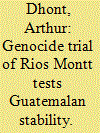

|
|
|
| 14 |
ID:
115505
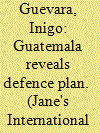

|
|
|
| 15 |
ID:
069420
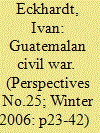

|
|
|
| 16 |
ID:
084934
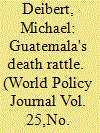

|
|
|
| 17 |
ID:
068202
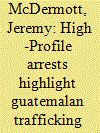

|
|
|
| 18 |
ID:
067793
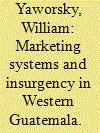

|
|
|
| 19 |
ID:
018891
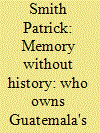

|
|
|
|
|
| Publication |
Spring 2001.
|
| Description |
59-72
|
|
|
|
|
|
|
|
|
|
|
|
|
|
|
|
| 20 |
ID:
095857
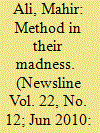

|
|
|